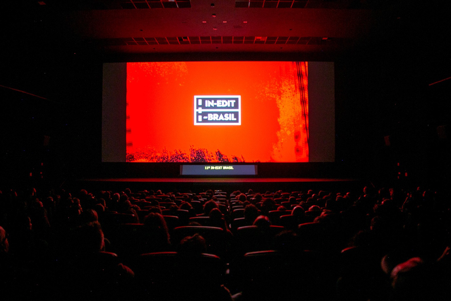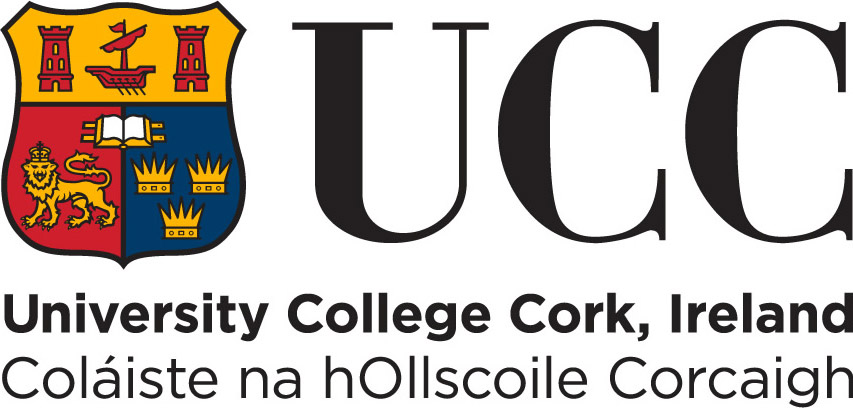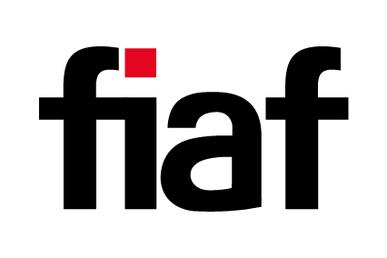Programming Brazilian Music for a Global Film Audience: An Interview with Cristian Pascual
Tamara Courage and Albert Elduque

Figure 1: Screening at the 11th edition of In-Edit Brasil. São Paulo, 2019. Photograph by +Um Coletivo.
Music is one of the most cherished topics in Brazilian documentary filmmaking. Vinicius (Miguel Faria Jr., 2005), Raul: O início, o fim e o meio (Raul: The Beginning, the End and the Middle, Walter Carvalho, 2012) and Chico: Artista brasileiro (Chico: Brazilian Artist, Miguel Faria Jr., 2015) feature among the most successful Brazilian documentaries from the last twenty years, which makes clear their appeal to national audiences. However, to better articulate their significance it is also crucial to understand them from an international context. The In-Edit – International Music Documentary Film Festival, an event solely devoted to the screening and discussion of music documentaries, allows us to do so. First organised in Barcelona in 2003 and swiftly exported and adapted in multiple countries, the current In-Edit occurs annually in Chile, Brazil, Greece and the Netherlands. Throughout the years, it has also been celebrated in Argentina, Mexico, Germany, Colombia and Peru.
In-Edit Brasil was first organised in São Paulo in 2009 and showcases a wide variety of music documentaries both from Brazil and abroad. At the same time, some Brazilian music documentaries are screened in other In-Edits, such as Chile and Spain. In effect, In-Edit organisers hold a privileged perspective on the role that Brazilian music and Brazilian music documentaries play within the international scene.
Cristian Pascual (Barcelona, 1980) was the director of In-Edit Barcelona from 2007 to 2019, and he is still part of the organising committee. We met him in São Paulo in 2017, and he provided us with a programmer’s view of music documentaries from all over the world. Despite how political events have altered the country’s international influence in global politics(most notably Jair Bolsonaro taking over as president at the beginning of 2019), we believe that Pascual’s views present a rich reflection on Brazilian specificities regarding the production and reception of music documentaries today.The interview was held in São Paulo on 25 June 2017.
COURAGE & ELDUQUE:In-Edit originated in Barcelona in 2003 and six years later it was exported to Brazil. Why did you decide to launch a Brazilian edition of In-Edit?
PASCUAL: From an entrepreneurial perspective it may sound like the wrong approach, but I must admit that at In-Edit we are not very pro-active at seeking out international partners. We have always worked in a reactive way. Typically, international versions of In-Edit have been initiated by people from other places who had a natural interest in the project and who then proposed to bring the festival to their own countries. In fact, we work with music and audiovisual media, which are two driving forces of culture anywhere in the world, so naturally this kind of transferability appeals to wide-ranging audience members. From the very beginning, it has worked this way. For the first edition of In-Edit in 2003, a Chilean audience member fell in love with the project, organised a meeting and said to us: “I think this could work in Santiago de Chile”. The following year, In-Edit Chile was launched. That was quite a big step for such a new project: it took only a year for In-Edit to become international! Then, sometime later, we approached the international strategy in a more systematic way. In 2009 we received many proposals and decided to do our first international expansion, which included Buenos Aires, Puebla (Mexico) and São Paulo, the latter being the only one that had a consistent run over the years. Aliche (Marcelo Andrade), who is the artistic director and the soul of In-Edit Brasil, used to live in Barcelona and we first met each other at a Brazilian Film Season there. At a certain point, he suggested initiating In-Edit Brasil, and we accepted. Overall, we have organised fifteen In-Edits in Barcelona, fourteen in Santiago de Chile and nine in São Paulo. These are the three more consolidated festivals and in recent years we have completed other international ventures including In-Edit Greece in Thessaloniki.
COURAGE & ELDUQUE:What are the particularities of the Brazilian edition of In-Edit?
PASCUAL: In-Edit Brasil is the one with the strongest local content, both in quality and quantity of documentaries. In comparison with other In-Edit festivals, the international documentaries in this country are less successful. Conversely, the strength of its national section is overwhelming. In Spain and Chile, it may be difficult to programme a strong section of national films, and national production maybe represents only 12–15% of the festival, while here almost half of the programme is national. For this reason, In-Edit Brasil has the largest programme, both in number of films and number of screenings.
COURAGE & ELDUQUE: Why do you think this is the case for Brazil?
PASCUAL: I think it is very related to Brazilian cultural isolation. Here’s the big picture: In-Edit’s main thesis is that music explains life, because music reflects the sociopolitical facts that allow for a specific style to emerge at a specific historical moment. For this reason, most often the task of importing and exporting music is not easy. In general, importing and exporting culture is difficult. For example, the USA achieved this after the Second World War, with the global popularisation of jazz. But take a look at Europe: to make music circulate within the continent is extremely hard. I don’t feel engaged with French music, and French music isn’t linked at all to Norwegian styles. This may explain the general lack of connection and empathy between European countries. I am not a scholar and these theories may be a bit oversimplified, but this is my view as a programmer of In-Edit. In this landscape, there are very few countries which are exporters. English-speaking countries are the most prevalent exporters and Brazil is another. Furthermore, Brazil has preserved strong musical traditions so very few international imports make an impact on its domestic market. So, compared with other countries, a relatively modest amount of foreign music filters through.
COURAGE & ELDUQUE: Indeed, it is impressive how important national music is for Brazilians.
PASCUAL: It is a very isolated, paradigmatic, peculiar country, and this influences the circulation of its cultural assets. In terms of the festival’s organisation, In-Edit Brasil is the one which is more autonomous in its design and programming. Over the years, we have come to understand that In-Edit is not McDonald’s; instead, we are working with culture and must adapt to the specificities of each country. While we feel that Santiago de Chile has some similarities to Barcelona in terms of its cultural connections, the structure of its society, of its urban dynamics, in the case of São Paulo we feel a bigger social and cultural difference. There are also important economical peculiarities which explain Brazil’s isolation. The country has strong protective tariffs. For example, it is hard to import audiovisual contents, and sometimes we carry the films ourselves on flights to avoid problems with the customs union. In addition, here there is an impressive consciousness of the importance of audiovisual media, with incentives for private companies and policies for TV networks to invest in films. For example, In-Edit Brasil is funded via a cultural sponsorship scheme which is more effective than the traditional patronage that you may find in Spain or Chile.
COURAGE & ELDUQUE: What does this cultural sponsorship consist of?
PASCUAL: Brazil, in a similar way to Mexico, has strong tax relief policies to promote cultural sponsorship. In Spain I must seek out a specific brand with specific interests and convince the marketing team that investing in In-Edit is worth their time and money. In the case of Brazil, the government selects a certain number of events which can be sponsored by private companies, and then companies select events to invest their money in, which has the added incentive of a tax relief. This way, the government stimulates an investment in culture, and this becomes part of a private company’s DNA. As a result, here in Brazil it is companies that approach events, while Spain’s festival organisers are forced to do the leg work. Also, while all other In-Edit festivals rely heavily on box office returns for their revenue, In-Edit Brasil’s film screenings are free of charge thanks to its cultural sponsorship. In-Edit Brasil has the third highest audience numbers, with 10,000–15,000 spectators per year. Barcelona receives around 30,000 and Chile 20,000.
COURAGE & ELDUQUE: Some Brazilian music documentaries are shown at In-Edit Barcelona and Chile. What is the reaction from non-Brazilian audiences to these films?
PASCUAL: This is the most difficult question you will ask me today. The answer is related to the issue of cultural imports and exports. Consider, if you will, that as a rule only the best music documentaries successfully achieve the music style they portray. In exceptional cases, the film peaks a viewer’s interest in a specific band, scene or musical movement that was previously unknown to them. Paradigmatic cases include Searching for Sugar Man (Malik Bendjelloul, 2012) or Last Days Here (Don Argott and Demian Fenton, 2011), in which, regardless of a viewer’s knowledge of Bobby Liebling and his band Pentagram, he or she could get involved in the film’s storytelling, Liebling’s downfall and resurrection, personal growth themes and so on. Unfortunately, very few music documentaries achieve that. As a result, the hook for 80% of In-Edit’s audience is music, and not the films themselves. Add here the lack of circulation of music across the borders that I mentioned before. Then, imagine the choices of an average spectator in Barcelona: you can choose among fifty films to watch, and in fifteen of them you know all the singers and lyrics of the songs. Then you have the Spanish films, which are culturally closer to you. Will you choose a film about an unknown singer from São Paulo? Not at all. To compensate for that, in Barcelona we organise screenings for the award-winning films from the national sections at In-Edit Brasil and In-Edit Chile, and they are free of charge. However, the most successful films are always the ones about internationally well-known artists, most notably from English-speaking countries. What is the particularity of Brazil? That within the limited possibilities for films on national music to perform successfully abroad, Brazil is one of the countries with greater scope to circulate internationally, although far less than English-speaking countries. It is exceptional in this regard, because it is a big exporter of music, and some of its artists achieved prominence on the international scene. In general terms, as a programmer in Barcelona, I know that the reception of a Brazilian music documentary will be more favourable than the reception of a music documentary from Peru, Italy, or Slovenia. I am also aware that a Brazilian music documentary which is screened in Barcelona is always more successful than a Spanish music documentary which is screened in São Paulo. Some years ago, we screened Tropicália (Marcelo Machado, 2012) at the In-Edit international section because artists such as Caetano Veloso, Gilberto Gil and Tom Zé are actually in the global imaginary. There was a great response from the audience.
COURAGE & ELDUQUE: Indeed, the film starts with Caetano Veloso and Gilberto Gil on Portuguese television with the anchorman asking them to define Tropicália for a British spectator.
PASCUAL: To look abroad is crucial. The artists in the United States are fully conscious of this, and they conquer the world using their culture. From the outset, they think about international exhibition. And this doesn’t happen here in Brazil. Here, they prioritise strengthening the national industry and then they may consider exports in the future. The same occurs with Brazilian music: it may be exported, but it has a local vocation. Apart from that, there is the issue with the local understanding of cultural and historical nuances. A major distinction with English-speaking countries is that 90–95% of local content in Brazil, Spain and Chile has local ambitions and so producers take cultural knowledge for granted. And when you screen local content with local ambitions to a public audience from another country that may not understand it, that cultural connection is lost.
COURAGE & ELDUQUE: What about the circulation across Latin American countries? Is there a fluent circulation between In-Edits in Brazil and Chile?
PASCUAL: Brazil is very isolated. It is easier for Chile, Argentina and Peru to connect with each other, for example. In Brazil you have a language barrier, which involves some practical issues, for example the need for subtitles. Also, it is a huge country, and huge countries, which are countries of countries, already struggle to circulate their music within the national market, so they obviously are less concerned with the export market.
COURAGE & ELDUQUE: In terms of international success, is there a difference between Brazilian films about Bossa Nova and Tropicália (styles which have been widely exported), and Brazilian films that focus on other styles, such as rock and punk?
PASCUAL: Of course. I haven’t thought much about it, but, simplifying a bit, it seems that specific styles belong to specific countries. Hardcore, pop and rock belong to English-speaking countries, because they were born there, and what emerges somewhere else are local adaptations which don’t have the same international success. Bossa Nova and Tropicália belong to Brazilian music, they are unique to this country, so they succeed internationally. Can a documentary about Brazilian rap or Brazilian hardcore be a successful Brazilian export? This is more difficult, because documentaries about hardcore and rap already exist in major markets such as the United States. As I said before, 80% of In-Edit’s audience attend because of their previous music knowledge. So, in Barcelona or Santiago de Chile you have an audience which are open to Caetano Veloso, samba and Bossa Nova, but will be indifferent to carioca funk. I must add here that there is also a generational gap, which will be a big challenge for music and audiovisual media in the coming years. We seem to be stuck in the 1960s and 70s, to Dylan and Coltrane… I’m always wondering when we will forget once and for all about those times and move on…
COURAGE & ELDUQUE: Most Brazilian music documentaries are biopics, so they are focused on a specific singer or songwriter. Is this a Brazilian specificity?
PASCUAL: No, it happens everywhere. I think one of the most fascinating things for people is creativity, the skill to generate something new, and how this is generated by a person. You may be fascinated by Iggy Pop or Elis Regina. On a second level, you can go beyond that personal fascination and talk about a specific scene or context, but at the end of the day what is appealing to both filmmaker and spectator is the creative genius. In Barcelona we also organise Moritz Feed Dog, a film festival that focuses on documentaries about fashion. It has been running for three years and next September the Brazilian edition will be launched here in São Paulo. Fashion is not as strong as music in terms of emotional involvement, but both deal with a creative genius, either the songwriter or the designer. In terms of storytelling, it is much harder to explain a movement than to tell a person’s story. You are never able to show all of a character’s dimensions, but it is much more difficult to explain where a specific genre starts and ends, its various influences and people involved… As a narrator, it is much easier to rely on the icon.
COURAGE & ELDUQUE: Here in Brazil, the success of music documentaries coincides with successful fiction biopics. For example, if we consider the twenty most successful Brazilian films in Brazil in the last twenty years, two of them are music biopics: Dois filhos de Francisco: A história de Zezé di Camargo & Luciano (Two Sons of Francisco, Breno Silveira, 2005) and Cazuza: O tempo não pára (Cazuza: Time Doesn’t Stop, Walter Carvalho and Sandra Werneck, 2004).[1] And TV Globo has produced both music documentaries and music fictional biopics. Is this part of the same tendency, both in Brazil and internationally?
PASCUAL: At In-Edit, we have programmed some fiction films, for example Dois filhos de Francisco, but this is on a rare occasion because our focus is documentary. However, and without having thought much about that, I believe that in the last fifteen years, attitudes towards music have experienced a mutation on an international level. I have the feeling that music has been widely legitimised and has become a regular topic of interest. People who produce and direct films on music today, and who produce cultural events, seem to show a stronger appetite for it than those who directed and produced fifteen years ago. In the United States it was something more established: think that in 2003 Martin Scorsese produced the documentary film series The Blues, in which he invited seven filmmakers to talk about music style. This shows you the value that a country places in its music. Now this legitimisation is global, and it may explain the international success of music biopics. An example that comes to mind is the fictional biopic Straight Outta Compton (F. Gary Gray, 2015), about the rap group N.W.A. I can’t imagine a biopic about a rap group such as this fifteen years ago. Music has conquered new territories in recent years. It is not underground anymore. In 2008, the Berlinale Film Festival opened with Scorsese’s Shine a Light, his documentary about the Rolling Stones, and when that happened, we realised that something crucial was going on.
Note
[1] In 2017, Dois filhos de Francisco was ranked third and Cazuza: O tempo não pára eighteenth. From 2000 to 2018, the former holds sixth place and the latter has shifted out of the rankings. No other music biopics have entered the list (“Evolução”).
References
1. The Blues. Produced by Martin Scorsese, Road Movies Filmproduktion & Vulcan Productions, 2003.
2. Cazuza: O tempo não pára [Cazuza: Time Doesn’t Stop]. Directed by Walter Carvalho and Sandra Werneck, Cineluz – Produções Cinematográficas, 2004.
3. Chico: Artista brasileiro [Chico: Brazilian Artist]. Directed byMiguel Faria Jr., 1001 Filmes, 2015.
4. Dois filhos de Francisco: A história de Zezé di Camargo & Luciano [Two Sons of Francisco]. Directed by Breno Silveira, Conspiração Filmes, 2005.
5. “Evolução do mercado.” Filme B, www.filmeb.com.br/estatisticas/evolucao-do-mercado. Accessed 9 May 2020.
6. In-Edit – International Music Documentary Film Festival. www.in-edit.org. Accessed 9 May 2020.
7. Last Days Here. Directed by Don Argott and Demian Fenton, 9.14 Pictures, 2011.
8. Raul: O início, o fim e o meio [Raul: The Beginning, the End and the Middle]. Directed byWalter Carvalho, A.F. Cinema e Vídeo, 2012.
9. Searching for Sugar Man. Directed by Malik Bendjelloul, Red Box Films & Passion Pictures, 2012.
10. Shine a Light. Directed by Martin Scorsese, Shangri-La Entertainment, 2008.
11. Straight Outta Compton. Directed by F. Gary Gray, Broken Chair Flickz, 2015.12. Tropicália. Directed by Marcelo Machado, Bossa Nova Films, 2012.
13. Vinicius. Directed by Miguel Faria Jr., 1001 Filmes, 2005.
Suggested Citation
Pascual, Cristian. “Programming Brazilian Music for a Global Film Audience: An Interview with Cristian Pascual.” Interview conducted by Tamara Courage and Albert Elduque. Alphaville: Journal of Film and Screen Media, no. 19, 2020, pp. 139–145, https://doi.org/10.33178/alpha.19.11.
Tamara Courage recently completed a postdoc at the University of Reading for the project Towards an Intermedial History of Brazilian Cinema: Exploring Intermediality as a Historiographic Method. Here, she expanded on the notion of intermediality in world cinema by investigating how it is used as a strategic tool in contemporary Chinese independent cinema to highlight issues regarding marginalised citizens who have been impacted by major socioeconomic transformations since the death of Communist leader Mao Zedong. Her current research interests examine the filmmaker’s role in imagining and representing realities for the historically peripheral subject through diverse and original modes of interventions that include performance, self-portraits, re-enactment and participatory methods.
Albert Elduque has recently completed a postdoc at the University of Reading, where he was part of the project Towards an Intermedial History of Brazilian Cinema: Exploring Intermediality as a Historiographic Method. His PhD dissertation, presented in Pompeu Fabra University (Barcelona) in 2014, dealt with the concepts of hunger, consumption and vomit in modern political cinema. His current research is on contemporary Brazilian films on music, focusing on the representation of the musical traditions of the country in recent fictions and documentaries. He is coeditor of the journal Comparative Cinema, published by Pompeu Fabra University.









